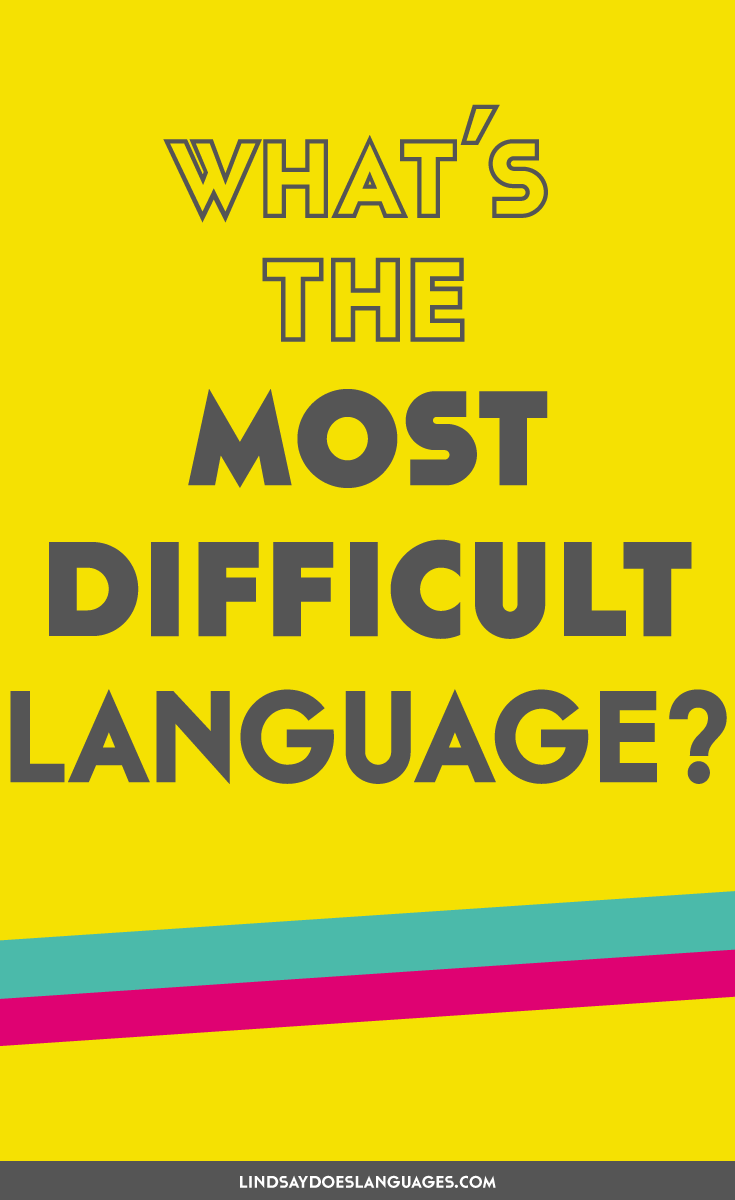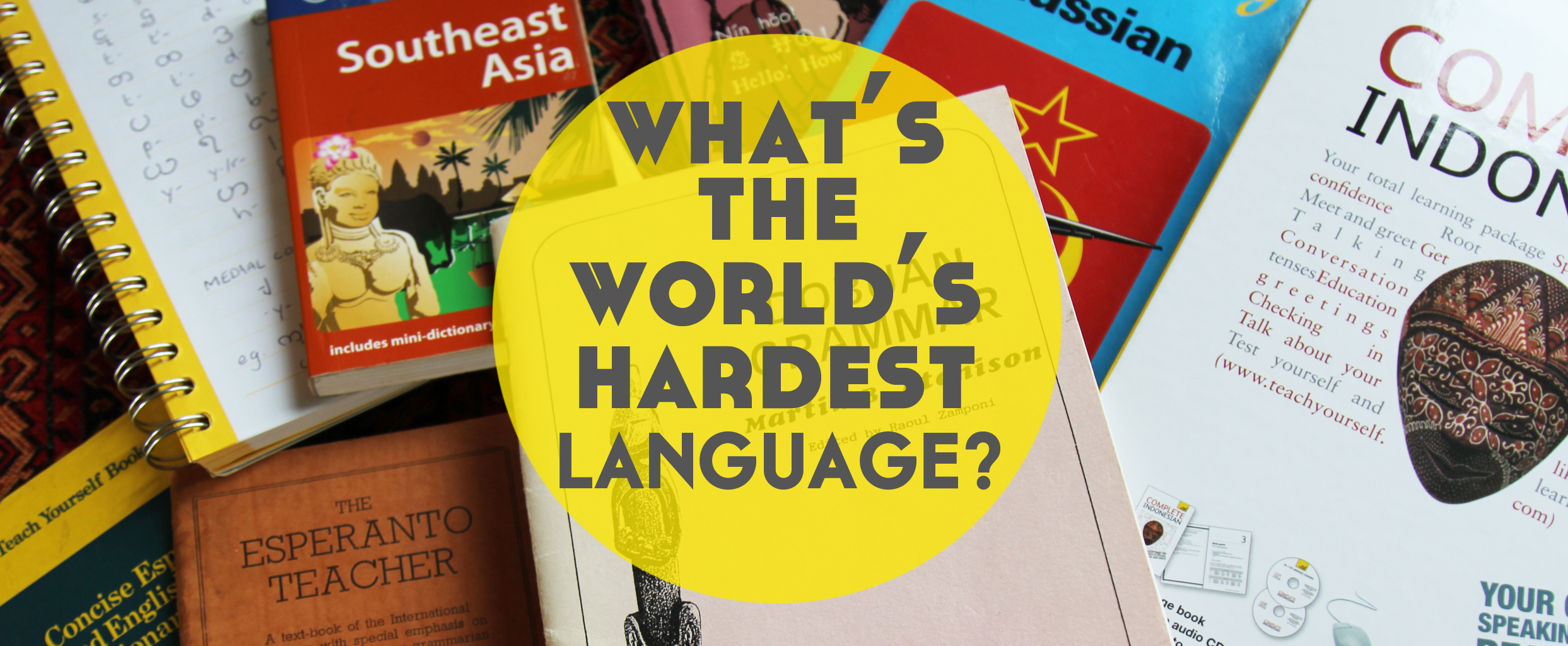October 14th, 2016
What’s the Most Difficult Language in the World?
The internet is filled with infographics, blogs, and all sorts telling us what the most difficult language in the world is. Or maybe that’s just the corner of the internet where I hang out.
Either way, I think it’s time to clear something up.

I’m going to throw something out there today: no language is the hardest language in the world. Boom. Shock shock horror horror.
But there is something that is true if we word things a little differently: some languages are harder than others for you.
So why is this? What makes a language difficult?
you don’t know related languages or they are language isolates
One of the earliest moments when I realised that it was possible to learn multiple languages was when I was 17, sat in Spanish class with the only other student in the class (#BritsLoveLangs) and our teacher.
Because he was a Colombian and taking the UK Citizenship Test, the conversation often came up of living abroad. When he said that with our knowledge of Spanish, we could easily learn Portuguese or Italian by living and working in the country for about a year, I was very excited.
The chance to learn so. many. languages just opened up to me. And I didn’t even know before then it would be possible. And I didn’t even know the word polyglot was a thing.
So what happened when I started learning German, my first non-Romance European language I’d studied?
It was easy at first. I knew the basics from friends who had studied German at school. And I’d been to Germany and Austria before. So I’d had some exposure and that means it’s bound to be a breeze, right? Wrong.
German was one of the hardest languages I’d ever studied.
German! You know, that Germanic language in the same language family as my native language.
What made German hard? Cases. German was the first language I’d been exposed to, never mind studied, that had anything to do with cases.
I just couldn’t get my head around cases.
But what if my native language was Russian, Polish or Finnish, to name just three, and I was used to cases? Would German be as difficult then? Probably not.
Or what if I already spoke Dutch? Just like if I’d been born in Moscow, Warsaw or Helsinki, learning German probably would have been easier for me than it was.
Just because I found German difficult definitely doesn’t mean everyone else will.
they have a different script
Although German was the first non-Romance European language I studied, it wasn’t quite the first non-Romance language. In 2009, I started out on a year of Mandarin Chinese study.
The course had just opened at The Open University and I was just starting my degree. Against the advise of some friends, in what has now proved to be a rather worthy life-changing decision, I opted to study two new languages rather than repeat French and Spanish at levels I could do easily. I chose to study Italian and Chinese.
I’ll be honest, I thought I knew what I was doing. I thought if I had mastered two languages well enough to pass my A levels and live and work (albeit briefly) in countries that spoke those languages, then I could learn any language. I was language-invincible. Langvincible? No? Ok then.
Italian was, as expected, the easier of the two and super simple at first. I was constantly getting crazy high marks up in the 90s (out of a 100) and it wasn’t too much of a challenge.
Chinese on the other hand? It deserved more of my attention than it got.
At risk of sounding like a complete idiot, although I’d studied really hard to pass all my exams and that jazz in languages up to that point, I’d never had to work, really work, to learn a language. So my early 90s in Chinese matching my Italian grades soon sunk down through the 80s and into the 70s and 60s. Like a time-travelling grade with a blue phone-box and a long scarf.
One big reason? I didn’t account for learning a different script. I, naively, figured that the logographic characters that make up written Mandarin Chinese would seep into my brain through some form of word-mosis and I’d be a Chinese pro in no time just because I was taking the course. So wrong.
Chinese wasn’t just hard because of the different script, but it definitely played a big part in why I didn’t do as well.
you have zero resources or opportunities to use the language
Let’s speed back forward through time to more recently. To be specific, early 2016. The language? Korean.
Korean is a joy. But it’s no walk in the park. In fact, it’s probably the language that has come closest to topping my personal “most difficult language” list. Watch yo’ back, German.
When I started learning Korean, I had no physical resources.
This made for a whole new challenge.
After years of formal language study with textbooks and materials provided, followed by learning other languages with books and resources in hand, it was an interesting challenge to study Korean so resource-less-ly. Definitely a word.
Of course, I’m talking physical resources and it’s fair to say, I had plenty of online resources at my disposal, many of which I used willingly.
However, it made me aware just how difficult it would be to learn a language without the online crutch of resources to lean on.
Knowing what awaits me next year as I venture into learning bits of Burmese, Tok Pisin and Dobuan, all languages with significantly less resources than I’m used to, I’m preparing myself for this new challenge.
you have zero motivation or reason to learn it
Maybe you’re in school and you have to learn the language you’re studying. Maybe you have absolutely no interest in that language whatsoever. Sucks, right?
When you just don’t connect with a language it can be hard to break past that, making it possibly the most difficult language in the world for you.
That said, I never met a language I didn’t like. Not yet, at least!
you live far from this place
Korean was hard for me but grouping that with Chinese and Japanese and saying “Asian languages are hard because I speak European languages in Europe and it’s different blah blah blah” doesn’t work. Asia is the world’s biggest continent – how can “Asian” languages be “difficult”? That’s over 2000 languages. Wow. What a generalisation.
Does that mean that Manx and Welsh would be ridiculously easy for me because they’re languages of the British Isles and I’m British? Heck no.
My stories I’ve shared with you throughout this article aren’t even that relevant because this is just me. One person out of 7 billion plus. Living in one place. Growing up speaking one language.
We’re so lucky now to live in a world better connected than ever before. A world where I can start my day watching K-drama while I wash up, listen to Indonesian news podcasts at work, and then finish the day with a run to some Spanish reggaeton. (Because reggaeton is good for the soul. I swear.)
So what’s your point, Lindsay?
My point is this: what makes a language difficult goes beyond a simple and generic infographic, as cute as they may be to share (and believe me, I have shared).
Of course, there are elements of languages that are more difficult to grasp than others. But how easy or difficult a language is for you to study depends on all of what I’ve shared with you above and so much more. So if you’re considering studying a language based on how difficult or how easy it is according to the internet, think again. To put it simply, ask yourself: how much do I want to learn this language?
Only then will you be able to rank it on the language-difficulty-o-metre.







